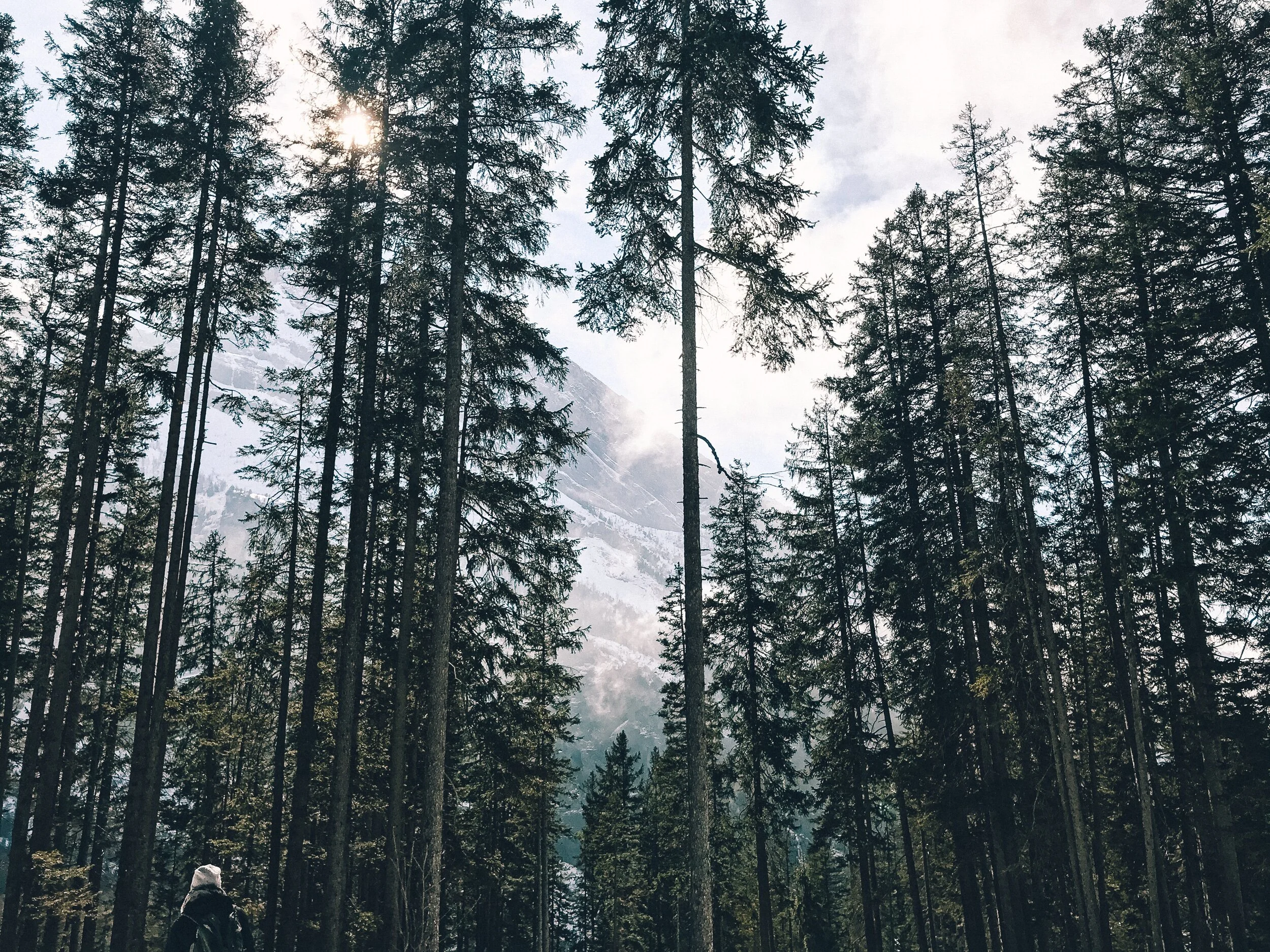What I've Read: Quarantine Edition
In these times of social distancing and WFH and quarantines and lack of human touch and just general anxiousness and uncertainty, seems like one of the best things we can do is get lost in a really great story. I certainly have not been all that productive during these last four weeks of self-isolation, but I have savored the few extra moments I have in the day to read. Here’s my take on reading in the time of coronavirus.
As per usual, none of the books I’ve read the last few months could be considered light reads. BUT - I will mention that I’m just beginning The Guernsey Literary and Potato Peel Society and ridiculous title notwithstanding, it is a delight so far! The type of book that gives me a warm, sun-on-my-face feeling. It’s too soon to give a full review, but I have an inkling this might be the “corona-friendly” read you are all looking for!
The Overstory, Richard Powers
"What do stories do?”
"They kill us a bit and make us change.”
The Overstory killed me a bit. It made me look at trees - actually, the entire natural world - differently. But mainly trees. These intelligent, ancient, living beings that have been around for thousands and thousands of years and, if allowed, will be around longer than you and I will live. You know that feeling, when you are looking at a mountain range or a grand canyon or forest of redwoods and just feel like a really small part of something huge? That is how this book made me feel. So, yes, this is a novel about trees. It’s about nature and humanity, the ways these two existences are so intricately intertwined, and how much us humans have to learn about the world around us. I guess you could call it environmental fiction. It’s a work of activism, to be sure, but beautifully and delicately written.
And don’t worry, it’s not abstract. There is a defined storyline - 12 different stories, to be exact, that branch and wind and somehow all come together. If you just started it and are struggling to get through - trust me, keep going. At first, I simply couldn’t get into the story and walked away for about five months. You just have to go with it, as you might wander around a bit lost in a forest, taking it all in. Which, I think, is the best way to read a 500+ page novel about trees, anyway.
Girl Woman Other, Bernardine Evaristo
I LOVED this book. It’s absolutely BRILLIANT. And yes, both those sentences required the ALL CAPS, because we are all social distancing and I can’t come over and shove a copy in your arms, so I need to convey my desire for you to read this IMMEDIATELY. Girl Woman Other centers around 12 interwoven stories about 12 characters (12 seems to be the lucky number in the literary world), all about the black female experience. It’s a broad and diverse spectrum, with women from different generations, faiths, classes and backgrounds. I liked that even though each story was strong enough on its own, the overlapping layers (like one character appearing in another character’s story) added subtle depth and nuance.
Even the very act of reading this book is an experience in itself. The writing is beautiful - if somewhat unconventional. I’ll tell you up front: punctuation is thrown out the window. Just completely discarded. No commas, no periods, no quotations, nothing. Which, I promise, sounds crazier than it really is. I found myself not noticing it just a few pages into the novel, and grew to love the lyrical, almost poetic flow. If you aren’t a big poetry reader, please don’t let that term scare you away. This is novel, and it feels that way.
Station Eleven, Emily St. John Mandel
“Survival is insufficient.”
I’ll be the first to admit: reading a novel about a flu pandemic, during a pandemic, is perhaps a questionable choice. However, upon finishing it, I can’t help but also think - maybe this is exactly the right time to read this book. Yes, the context of this book is a pandemic that wipes out 99% of humanity. But I found that it focuses less on the actual disease/ ensuing chaos and breakdown of civilization (because yes, that does happen), and more on the world before and the world after. The purpose of the book isn’t the story of the collapse - but instead, a story about people and their resilience. It’s a book of warm imagery and nostalgia and above all, the dark grace of survival in a fallen world.
The book opens with a theater production of King Lear on a snowy night in Toronto. A famous actor dies on-stage of a heart attack, and hours later, the world begins to fall apart. And then the book moves back and forth between time: from the actor’s early life decades before the pandemic, to a roaming caravan dubbed the ‘Traveling Symphony’ that performs in the wasteland of what remains, twenty years in the future. “Survival is insufficient,” a quote lifted from Star Trek and painted on the side of the Traveling Symphony’s caravan, is the thrust of the book. How do we survive the end of what we knew? What does it mean to be human? I’ve never read an “apocalyptic” novel quite like this, and I just found the whole thing beautiful.
Long Bright River, Liz Moore
At the heart of this story are two sisters, whose lives have taken them different paths. Mickey becomes a cop, while Kacey, her older sister, is an addict. They were once inseparable as children, but now they find themselves completely estranged. Mickey begins investigating a string of unsolved female murders in her precinct, while simultaneously searching for her sister, who has gone missing. It’s a story about the bond of two sisters, but also about the dark reality and human cost of opioid addiction.
It’s another long book, at over 500 pages, but there is a “thriller” element which helps move the storyline along. I found it to be emotional, and uncomfortable at times. I think about the communities in the US that have been hardest hit from the opioid crisis and I know that stories like this play out every day. The characters are real: they make bad choices, and misinterpret situations, and have regrets, and try to navigate the complex dynamic of relationships as best they can. I kept turning the pages not because I wanted to find out who the killer was, but because I just really wanted things to work out OK in the end.
The Education of an Idealist, Samatha Powers
If I am being honest, the true reason I picked up this book was because of dual courses I was taking for my masters program (Political Violence and Ending Violence), and I felt I needed to bone up on my knowledge on international relations, US foreign policy, humanitarian interventions and the like. And this memoir absolutely put context around some of the more complex foreign policy decisions of the last 20 years. But I was really captivated by Samatha Powers’ story. She emigrated to the United States from Ireland as a child, and then became a war correspondent in Bosnia, human rights advisor to Obama, and ultimately, the US Ambassador to the United Nations.
Powers spoke out about genocide when no one seemed to care, and throughout her career she was laser-focused on trying to get the world to pay attention to the atrocities people bear under repressive governments or war-torn societies. She writes frankly about her transition from an uncompromising, superidealistic Power to the realist, policy-making Power, and how difficult and complex it can be to balance realism with idealism. There are some sections that felt a little self-congratulating, or too seeped in American exceptionalism for my liking, but overall I found it though-provoking.
The Underground Railroad, Colson Whitehead
This is an important book. We need these powerful, compelling and gut wrenching reminders of slavery in the South. And it’s also a heavy book - slavery narratives will also be heavy. The main premise is on the story of Cora, a young slave who attempts to escape via the Underground Railroad. Whitehead’s idea to turn the Underground Railroad into a literal railroad, with hidden stations and conductors and the like, was a really compelling literary device. His writing style is a little bit detached, which made it a little difficult to emotionally connect with the characters. But it was also this slightly stark, matter-of-fact way of writing that made both the despair and (rare) optimism cut a little deeper.
I keep thinking about the way slavery, racism, and systemic injustice was presented to me in high school, through books like Uncle Tom’s Cabin or To Kill A Mockingbird. Those are American classics, but maybe it’s time we added to those high school summer reading lists with more modern takes like this one.
And, two books I read, liked, but just didn’t love. I’m not saying don’t read these! Three out of five stars isn’t bad. But - read the ones above first ;)
Circe: I love the entire idea of this book’s premise: the feminist retelling of the life of Circe, the little-know daughter of the Greek Sun God, Helios. The story of the bad-ass goddess famous for turning evil men into swine? Sign me up. But something about the writing in this book was just a bit too...much...even for me. And I am a wordy person! Give me wordy, flowery prose - most days. It just felt far too overwrought. Instead of drawing me in, my mind kept wandering off. I did like the bits about other characters in Greek mythology, but at times found myself a bit bored with the story of Circe herself, and, I mean, it’s her story.
The Most Fun We Ever Had: Man, I had high hopes for this book. I love generational family sagas, and plus, it was my pick for book club so I didn’t want to let anyone down with my choice (so much pressure!). But while the writing was great, and some of the storylines tackled interesting moral dilemmas, I could not bring myself to like any of the characters. The four daughters, in particular, drove me insane. I like messy stories, I like complicated family dynamics - but I just felt that most of these characters were snarky and whiny and I just couldn’t bring myself to care about their issues for five hundred pages.
But however, now that I think about it - maybe this is good choice for a book club. In our group, a few people liked it, some were ambivalent, some couldn’t stand the characters (like me), but all the differing opinions made for really interesting conversations!
That’s all for now! Wherever you are in the world, whatever situation you might be in, I’m sending lots of love. Hang in there.












